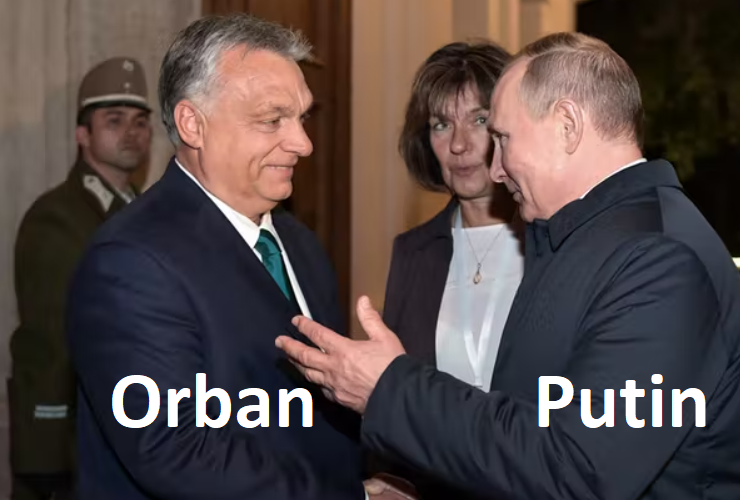“Stockholm Syndrome” is a psychology term that refers to the victim’s attachment to the aggressor. It is this term that can describe the relationship between official Budapest and Moscow, where there is a fettered protester who supports the strongman.
The syndrome is named after the real events in Stockholm that took place in 1973. Then the criminals took hostages in the bank, but they became so obsessed with the robbers that after the release, and contrary to the logic, they paid lawyers for their captors, and kept in touch with them after these events.
Budapest’s current policy towards the Kremlin clearly shows signs of the above syndrome. Hungary wanted to pursue a policy independent of Brussels and Washington only to fall into the tender arms of Moscow.
For years, Budapest has been an outpost of the Russian policy toward the EU. It is Budapest that is blocking the embargo on energy imports from Russia to the EU. Before that, it blocked the disconnection of Russian banks from SWIFT.
In addition, Hungary is at loggerheads with NATO’s policies and does not miss the opportunity to defend Russia’s strategic directions. In particular, it did not approve assistance to Ukraine in cyber defense for a long time. It still does not approve the transit of military equipment to Ukraine; not to mention the provision of Soviet-style equipment in exchange for more modern equipment.
Prime Minister Viktor Orban emphasizes that he will not allow the country to be drawn into the war, citing the protection of the rights of Hungarians. At the same time, this is not in line with the policy of protecting the rights of Hungarians abroad. 151,000 Hungarians live in the Trans-Carpathian Region in western Ukraine. The region was recently shelled by Russian cruise missiles. Budapest was not moved by this and did not reconsider relations with Russia.
Budapest is captive to Russian money
Moscow is generously investing into anything against the West. Unlike Western financial institutions, reforms are not required in order to get a fringe benefit from Moscow. One obligation remains, and that’s to harm Brussels.
Yes, Budapest, under the guise of a “balance” policy and the protection of “Hungary’s interests”, simply got into energy bondage. On September 27, 2021, Gazprom signed a new 15-year contract with Hungary for gas supplies. Two long-term contracts were signed between Gazprom Export and MVM CEEnergy Ltd.
The total volume of contracts is up to 4.5 billion cubic meters. It is important that under the new terms of the contract, Russian gas is supplied through the Turkish Stream, i.e. bypassing Ukraine.
At the same time, Budapest does not pursue a policy of risk diversification. In particular, the country receives 65% of oil from Russia and another 16% from Moscow’s ally Kazakhstan. Hungarian companies also produce gas and oil in Russia, where the Hungarian government-owned MOL has a field. Of course, Hungary is not interested in the embargo on this gas and oil.
But not gas and oil alone. Another important project is the construction of the next series of the Paks nuclear power plant, which is being carried out for the Hungarians by the Russians. The point is not only that the Russians are building new power units, but also that it is the Russians who are supplying nuclear fuel there. Moreover, new units will also be made for Russian nuclear fuel. As a result, we have another energy dependence of Hungary.
In addition to energy, Budapest is bound by joint infrastructure projects with Moscow. It is the Russian Federation that is implementing a metro modernization project in Budapest. The Russian company MetroVagonMash delivered 222 metro cars to the underground of the Hungarian capital. However, such contracts are not only about the sale of metro cars but also about service, which is almost impossible to get rid of.

The truth is, Hungary is the key partner
The Russians are actively financing the development of the Hungarian railway. One of these is the freight terminal in vil. Fényeslitke, which is being built with the Russian money. In addition, before the full-scale invasion of Ukraine, it was the Russians who planned to invest in the construction of a Budapest bypass to improve transit. So far, its termination has not been officially announced.
While Orban is selling the idea of independent policy to the population, in fact Hungary is becoming dependent on Moscow in all strategic areas of infrastructure and energy. This union allows the Hungarian government to usurp power and not comply with Brussels’ demands.
At the same time, Orban recently even made territorial claims to Croatia, saying that the collective action had taken away the Hungarians’ access to the sea and that the country could not get any gas other than Russian.
“Tragic history of the union”
Official Budapest, by demonstrating its will against Brussels and Washington, plays on the imperial nostalgia of the Hungarians for their country’s great past. Moscow is helping Orban in this. However, the history of Hungary has another milestone, which the country is trying not to mention.
In the tragic history of Hungary, there was already a union of Moscow and Budapest. This is the period 1949-1989, when the Communists came to power in Budapest with the support of Moscow. The results of this cooperation were repression in Hungary, the deportation of the population to Siberia, and the revolution of 1956 when the Soviet Union introduced tanks to suppress the country. More than 2,500 Hungarians were killed in a matter of a few weeks.
Of course, these events are 70 years old. But it is now that the people in power in the Kremlin are those who directly say that the collapse of the Soviet Union has been a tragedy. During the occupation of Ukrainian cities, the Russians immediately returned the monuments to Lenin to the central squares and hoisted the red flags of the Soviet Union. It is naïve to think that the Kremlin’s views with regard to Budapest have changed in 70 years.








